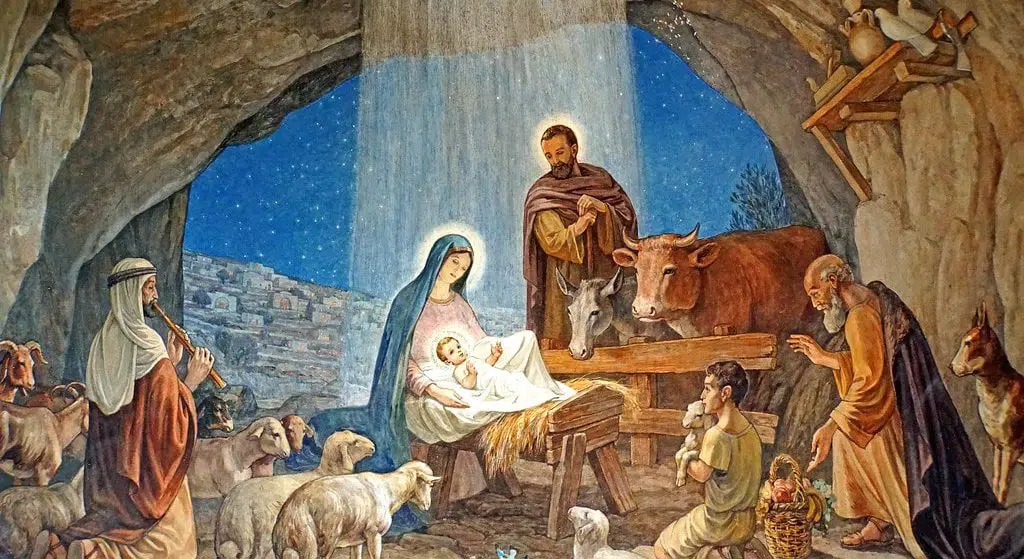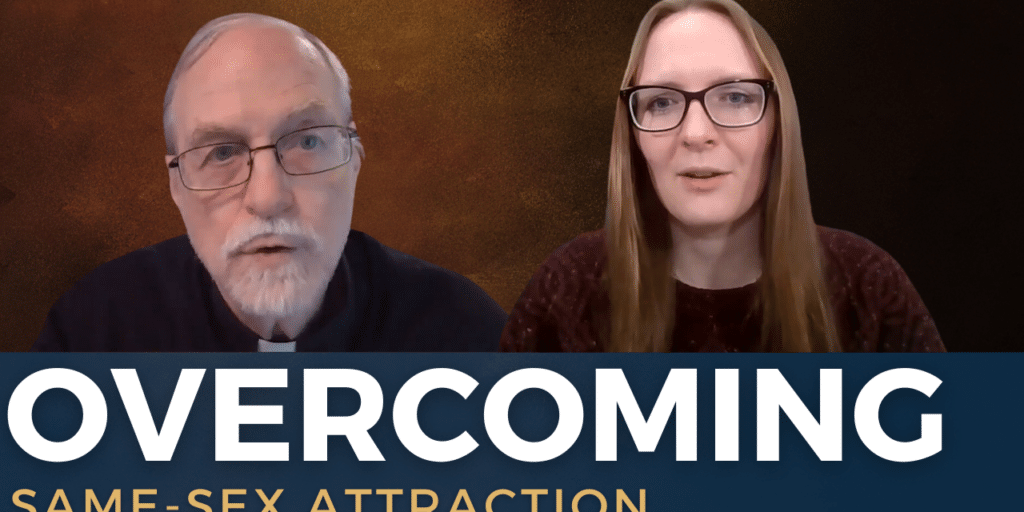The Nativity of the Lord and the Value of Human Life
“For while gentle silence enveloped all things,
and night in its swift course was now half gone,
thy all-powerful word leaped from heaven, from the royal throne.”
Wisdom 18:14
“In the beginning was the Word,” begins the Gospel of John. The “Word,” of course, was the Son, Jesus Christ.
Unsurprisingly, the passage above from the book of Wisdom has often been interpreted prophetically, as foretelling the coming, in the flesh, of the Word. On a night in Bethlehem, as all things were enveloped with gentle silence, then the Word leapt forth from His Mother’s Womb into the world, and nothing would ever be the same again.
And so it is that we find ourselves, today, once again contemplating in awe that scene in Bethlehem. We gaze upon the icon that is of inexhaustible significance for the entire human race, and yet of particularly poignant significance for those of us who labor in the vineyard in service of the Gospel of Life.
We see there the most beautiful human family in all of history, existing together in the perfect harmony that comes of a love placed entirely under the protection and in the service of God: the love towards which all married couples are called. We see a mother and a father gathered around a cradle, contemplating the inexhaustibly beautiful reality of new human life: a newborn child born into the world, holding all the immeasurable promise contained in every human infant.
And we see, for the first time ever, the full significance and dignity of human nature revealed in all of its glory, as the Infinite God Himself deigned to descend and take upon Himself that nature, willing not just to suffer all the normal pains of our postlapsarian state, but the ultimate pain of betrayal and death on a cross, so that He might restore a state of harmony between the human race and Himself.
Such is the worth of every human life! Such is the worth of every human family!
The Church’s liturgical calendar is a precious gift that calls us to once again immerse ourselves in this mystery: to contemplate this scene; to allow its beauty to overwhelm us; to celebrate this great mercy with all of our friends and families; to step back from all the anxieties, worries, and fears of the day-to-day, to appreciate anew the great mercies of God and the immeasurable beauty of the Gospel of Life.
Indeed, we in the pro-life movement live for nothing else than to protect everything contained in that scene in Bethlehem: to spread the spirit of Bethlehem throughout the world. Christmas is our feast. Let us throw ourselves into it with abandon, enjoying this sacred holiday, and all the rites, rituals, celebrations, and joys that it has to offer.
Allow God’s Peace In
And yet, I can hear some say, the world is in so much trouble. The Church is in so much trouble. How much comfort can we take at this time when we see the wolves surrounding us? When we see so much chaos and confusion, even in recent days and weeks, and even from those from whom we ought to expect only clarity and light?
It is true. There seems little question that we are living through a time of crisis. And yet, I must ask, why should we be surprised at this? Within our own grandparents’ generation, nations of millions sought little less than to annihilate one another. The history of the Church is, at least from the lens of the historian, an unending litany of heresies, schisms, intrigue, warfare, corruption, and scandal.
Are the corruptions, heresies, and scandals of our own age worse than those of others? Perhaps the answer is a resounding “yes.” Or perhaps it is simply that thanks to instant communication and the Mass media, those corruptions, scandals, and heresies immediately become globally known, and are daily thrust before our eyes, filling our hearts and minds with dismay.
It is hard to know. These things are difficult to quantify.
And yet, perhaps it doesn’t matter either way. It goes without saying that we must resist the temptation to downplay the realities, becoming the proverbial ostriches with our heads in the sand. But so also, we must steadfastly turn our minds to the constant teachings of the Scriptures and the saints, which exhort us to recognize that the correct response to the trials of any age remain the same: to remain steadfast in faith, to resist the temptation to despair, and to immerse ourselves in prayer.
Our purpose in being put on this earth is not to save the world, but rather to “know, love and serve God.” Christ Himself, when asked for the greatest commandment, replied, “Love the Lord your God with all your heart, with all your mind, and with all your soul.” If we do not know God, then how can we love Him? And how can we know Him if we do not encounter Him, speak with Him, contemplate Him? And how can we encounter, speak, and contemplate Him, if we do not avail ourselves of the most fundamental way of knowing him: prayer and contemplation?
It is towards this spirit of prayer and contemplation that Christmas insistently draws us: reminding us of the things that matter most; reminding us of the fundamental beauty of life; the immeasurable mercies of God that have been granted to us; and the reality that no amount of chaos and confusion can obliterate the fact of God’s having come into the world as a tiny baby, transforming powerlessness into power, and conquering sin and death.
Be the Saint Our Church Needs
As Cardinal Robert Sarah warns in The Day is Now Far Spent, “Without union with God, every attempt to strengthen the Church and the faith will be in vain. Without prayer, we will be clanging cymbals. We will sink to the level of media hypesters who make a lot of noise and produce nothing but wind.”
All of the testimony of the Scriptures and the saints testifies against this shallow spirit, which is fundamentally the spirit of “activism” of which Cardinal Sarah so often speaks critically, and which is treated with such prophetic power in Dom Chautard’s classic, The Soul of the Apostolate.
Ultimately, too much of the anxiety and fear that infiltrates the hearts and minds of the people of God in these turbulent times arises from a subtle spirit of pride. That is, it arises from the conviction that somehow, we ought to be able to control things. When, removed from the spirit of prayer, we come face to face with crisis after crisis, then we run the risk of working ourselves into a frenzy, thinking that if only we were to do more, to amass more influence or power, or to make the correct statements or launch the correct programs of reform, then we will turn aside disaster, and save the world. And when these things do not come about, then we fall into despair.
What makes this temptation difficult to avoid, is that none of these things are necessarily wrong in themselves. It is not necessarily wrong (and may indeed be precisely the right thing to do) to formulate plans, make statements, launch initiatives, seek control of levers of power, etc. However, what is wrong is to lose a sense of priority: to place actions of these sorts above being, as if our action can somehow supply for our failure to engage in the more difficult work of drawing closer to God, in which process we expose ourselves to the purifying fire of the heat of His Love.
We run the risk of forgetting, in other words, that our salvation began with an utterly helpless baby, lying in a bed of straw, in an insignificant inn in an insignificant town on an otherwise unremarkable night, far from the seats of power or prestige or influence. That is, we forget that God’s ways are not our ways, and that His timeline is not our timeline. That in Him, a thousand years are like a day, and weakness is made strong.
Christmas: The Cure for Acedia
Cardinal Sarah gives voice to the fundamental spirit of the Scriptures, when he groans his deepest desire, writing, “How I wish that a profound, uninterrupted prayer would rise up from the whole world: adoring praise and supplication. On the day when this silent song echoes in hearts, the Lord finally will be able to make himself heard and to act through his children. Until then, we create a barrier to him by our agitation and our chattering.”
Can you not hear in this cry, the cry of Christ Himself: “I came to send fire on the earth, and how I wish it were already kindled!”
For the good Cardinal, as for Christ, the remedy is straight-forward, albeit not easy: learn to pray. As he exhorts us, it is quite true that the Church is filled with traitorous churchmen. “But,” he warns us, “despising them isn’t the way to build Church unity.” This is not to say that we must ignore or praise their errors. However, it does mean that we must prioritize the one remedy that we can be sure will make a tangible difference in the world: “We do not reform the Church by division and hatred. We reform the Church when we start by changing ourselves.”
In a challenging exhortation, the Cardinal declares bluntly: “If you think that your priests and bishops are not saints, then be one for them.”
Easily said. Far more difficult to do. Especially in this age.
Prayer is, of course, the only true path to sanctity. And yet, practically everything in the modern world militates against developing this life of prayer. The noise, the temptations, the chaos, the fears and anxieties; the prioritization of doing and speaking over being and praying; the fundamental, unquestioned materialism that reigns supreme; the smartphones, the entertainment, the pornography, the pleasures and distractions of a world that is wealthy in terms of materials goods, but impoverished when it comes to the life of the spirit: all of these draw us away from the call to place ourselves within the concentrated, burning moment of authentic prayer with the Living God.
We are, as Cardinal Sarah diagnoses in The Day is Now Far Spent, overcome by the vice of acedia: that basic distaste for spiritual things that pervades the age; the deep-rooted spiritual sadness that drives us away from the effort required to pray, towards the distractions that proliferate all around us.
It is timely, therefore, to note that Cardinal Sarah identifies one particularly potent cure for this vice: the proper celebration of the Feast of Christmas! “In contemplating the manger and the Infant Jesus, who makes himself so close, our hearts cannot remain indifferent, sad, and disgusted,” he writes. “Our hearts open and warm up. The Christmas carols and the customs that surround this feast are imbued with the simple joy of being saved. In this sense, contemplation of the Incarnation is the source of any remedy against acedia.”
The Cardinal notes that those nations that have recently encountered the Gospel message, “are still astonished and enchanted by the beauties of God, the marvels of His action in us.” Meanwhile, the decadent West, in which Christendom so long flourished, has all the appearance of a “blasé old man” who is no longer astonished at anything, including—alas!—the fact of his salvation!
The West, Cardinal Sarah continues, “no longer shivers with joy before the manger scene; it no longer weeps with gratitude before the Cross; it no longer trembles in amazement before the Blessed Sacrament. I think that men need to be astonished in order to adore, to praise, to thank this God who is so good and so great. Wisdom begins with wonder, Socrates said. The inability to wonder is the sign of a civilization that is dying.”
So, this Christmas, feel free to turn aside from the noise and the chaos, no matter how important it might seem, and to live, without apology, within the many joys of the season. Sing Christmas carols with abandon! Give and receive presents with generosity and boundless gratitude! Enjoy feasts with family and friends! Allow this season to warm your heart, drawing you into a space of amazement and gratitude in the face of the beauty of Bethlehem.
And most of all, renew your commitment to prayer. Set time aside every day for real, authentic, focused, heart-to-heart prayer: the prayer that thaws our pride, and puts us before the face of God. Do not let your hearts be troubled! For Christ has already overcome the world.
As president of Human Life International, Fr. Boquet is a leading expert on the international pro-life and family movement, having journeyed to nearly 90 countries on pro-life missions over the last decade. Father Boquet works with pro-life and family leaders in 116 counties that partner with HLI to proclaim and advance the Gospel of Life. Read his full bio here.








Prayers are the answer; and the listening with patience has to be there as well. Like Fr. Boquet has said to shut out all the noise and listen. Something that has to be focused on. Thank you Lord for coming!
Your message to pray constantly rings true, Fr. Boquet. Thank you and Merry Christmas!
Good, true and beautiful! Thank you for a lovely Christmas meditation.